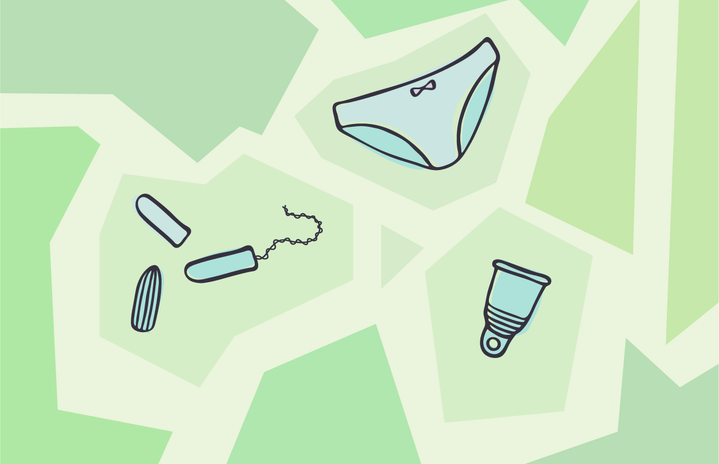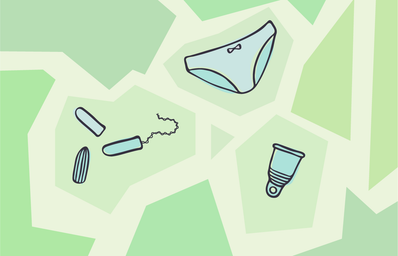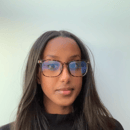In the last few years, there’s been a noticeable transition from traditional period care products (ie. tampons, pads etc.) towards more sustainable options. With this transition, though, have come the difficulties of finding the right products that work as well for you as it does for the environment. Some brands’ focus on sustainability has led to lesser quality products for the individual, and the ones who have found that healthy balance are priced ridiculously high (at least, for the average college student).
Luckily, Viv For Your V has asserted themselves as the go-to to solve all of the potential problems that come with finding the right sustainable alternatives to the tampons and pads sitting in your bathroom right now. Not only is the company creating Earth-friendly period products that work, but it’s also female-founded and run!
We spoke to founder Kate Diasti to get the rundown on her entrepreneurial journey, stemming from her college days, along with what differentiates Viv For Your V and their new tampons from others on the market.
Her Campus: What was the college assignment that gave you the idea for Viv For Your V?
Katie Diasti: The class was Entrepreneurial Marketing, and the semester project was to find a problem and come up with a solution for it, then do the market research and create a pitch for your solution.
At the time, I was going through my own sustainability journey and was learning about how much plastic waste was involved in period care — even in a lot of the “toxin-free” options! While doing more research in the period care space, I learned about all the issues surrounding periods (toxins in products, plastic, access to menstrual products, tampon tax, etc). I was shocked, and didn’t find a brand that I was super drawn to that resonated with me as a young millennial/gen-z consumer who is eco-conscious and socially conscious.
The professor is aware that we’re still working on Viv, and she’s super excited about the growth we’ve made. She’s continued to be so supportive of our work and journey.
HC: In the last half decade, sustainable period products have become more popular alternatives. How do Viv’s products differentiate themselves from other companies with similar products?
KD: We are so excited that there’s more innovation in this space! Viv is different in a number of ways. In terms of products, our pads and liners are made of a bamboo fiber core, and are totally plastic-free! They’re also toxin-free and 95% biodegradable. We also have a Viv menstrual cup that’s more affordable than most cups, but amazing for beginners since it has a ring on the bottom to help with removal.
HC: What was the biggest challenge you faced in starting a business that you were previously unaware of?
KD: A lot of the challenges come from the mental hurdle that is trusting yourself to make bigger business decisions. Another aspect was understanding where to allocate resources and funds at the very beginning. Since we’re a young team without extensive industry background, we got into the habit of taking advice, gaining mentors, participating in accelerators and doing A LOT of Googling.
HC: As an entrepreneur, how do you keep your motivation high, especially while in the beginning phases of your business?
KD: You must be so passionate about the problem you’re solving and the consumer base you’re serving to stay positive. At a startup accelerator workshop (when Viv was basically an idea on paper) a seasoned founder told us, “If you can’t imagine serving your customer for the rest of your life, you’re in the wrong space.” I knew then that I would gladly serve menstruators for the rest of my life.
Another crucial tip is to build community with other entrepreneurs and founders. Other young female founders building brands have been the reason I’ve stayed so positive. Having someone you can call up when everything seems to be crumbling (there will be plenty of days that feel like that) and they know exactly what you mean and what you’re going through is invaluable.
HC: Can you tell us about the process of establishing the various give-back campaigns you’ve run, such as with the Black Lives Matter movement?
KD: We created an interactive period journal with a menstrual cycle coach, and 100% of proceeds (pick what you pay style) went to BLM organizations. We’ve had a few campaigns on giving products to shelters during the beginning of the pandemic last March, where we donated 4,000 pads, and it became clear that activism and getting involved in our community would always be part of who we are as a brand.
After George Floyd’s passing we took the opportunity to share educational resources on our (small but mighty) platform, and despite not having a ton of resources as a tiny startup, knew we could provide an item that would allow us to give actual donations to BLM organizations who are experts in bringing change. We have so much more we hope to do, and plan to continue to be involved with nonprofit organizations and policy groups that help make systemic change.
HC: What is the biggest piece of advice you would give to women in college who are starting a business?
KD: Simply start! You’re going to be embarrassed by your first product or prototype, but it’s so much better to bring something imperfect into the world to learn and grow from than never get the confidence to begin. Oftentimes, we’re standing in our own way and can feel as though we aren’t suited to run a company.
The thing about entrepreneurship is you learn to be an entrepreneur while you are an entrepreneur. Learn how to sell something, to make something, to create, and that will be most valuable in entrepreneurship.


